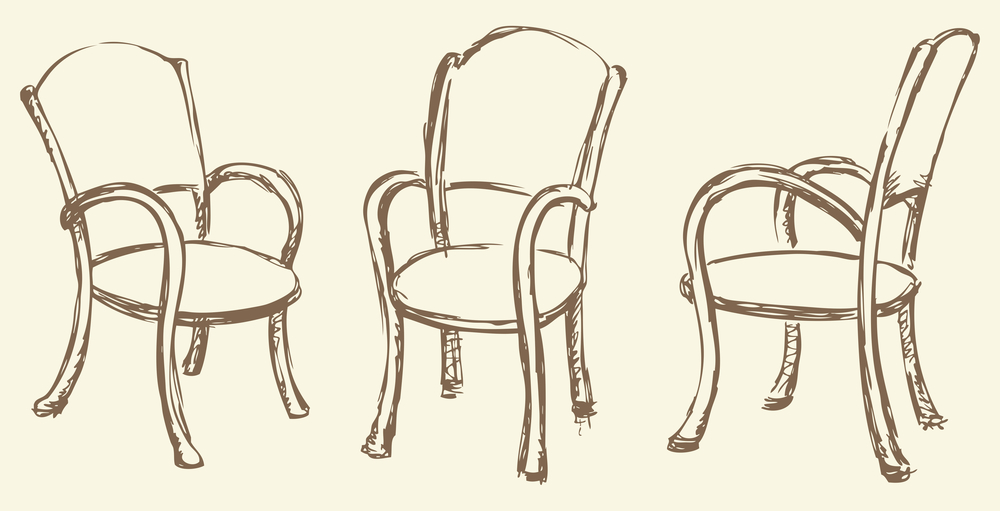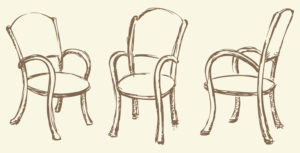

For over a week, some neighbors of mine up the street put 3 nice-looking chairs in front of their house. It was their way of inviting passersby on a busy street to take the chairs. As I said, though, the chairs were there for over a week. I think they were finally picked up by the trash collector.
This is a strong indicator of how well people are doing: you can’t even give away medium-quality chairs.
I tried something similar a few months ago. I put out an old-style color TV in perfect working condition. After 3 days, and not wanting my neighbors to be upset at me, I moved the TV into my garage. I’ll soon call a specializing trash company and pay them to haul it away. Again, this is a strong indicator of general economic well-being.
That reminds me of the first garage sale we had–in late 1990. Our stuff sold well and we made over $300 in about 3 hours.
Two years later, we thought we had enough good items to have another garage sale. This time, we collected under $150 in about 4 hours and finally gave up. My wife commented, “People must really be hurting financially.” I replied, “I think it’s the opposite.”

READER COMMENTS
MG
Apr 14 2019 at 5:35am
I think you are right.
Some other observations. Even when curbside items are picked up, they are often being picked up by “professionals” who are part of a process through which, components are recycled, metals are extracted, fabrics are shredded, or entire items are being shipped overseas to where they can actually increase the (lower) “economic well being” of the users.
In fact, many “donation outlets” like Good Will, Habitat, etc. have become picky — some items are no longer accepted, e.g. — because supply >> demand.
Finally, even if the lower demand for curbside (or garage sale) did not reflect demand for “inferior goods” but simply more efficient access to second hand goods through eBay, Craig’s, etc. this would also be cause for celebration.
David Henderson
Apr 14 2019 at 9:45am
All good points. Thank you.
Dylan
Apr 14 2019 at 5:49am
It is a good observation, and I agree with you to a point, however I think that it really indicates the flip in our economy from stuff to services. A lot of durable material goods like the ones you’ve mentioned are relatively very inexpensive these days, while services have become more expensive. Almost all of the furniture in my apartment has been acquired used in pretty much the same way you describe, neighbors leaving it in a place where it is understood it is for the picking. However, a few years back when the couch my wife and I had found a couple blocks away and carried home a decade before finally gave up the ghost, she went and decided to buy a new one. Remembering how much my parents had paid for a new couch when I was growing up, I kind of freaked, we definitely didn’t have that kind of money, and I was planning on looking on Craigslist. But turns out the couch she bought was $129, and has held up great for the 4 or 5 years we’ve had it. The 40″ TV we bought last year to replace an 11 year old broken set, cost me $150. The difference in electricity alone between it and a CRT TV would pay for that cost in a couple of years.
If you added up what we’ve paid for all the things in our apartment over the last decade, it would be about what we pay in rent for a single year. Our budget is roughly 40% for rent and utilities, 30% for food, 15% for health insurance (highly subsidized) and 15% for everything else, of which durable goods makes up a tiny, tiny fraction. The fact that I may now pass by some free stuff on the street doesn’t really feel like I’m all that well-off economically, just that my concerns are in other areas.
One other observation, I’m going to assume you live in a middle class or better neighborhood? Because transportation costs can be significant, your observation might just be telling you something about how well off your neighbors are, which can’t necessarily be generalized to a broader area.
David Henderson
Apr 14 2019 at 9:49am
True that it does reflect the lower cost of various durable goods and not just people’s higher income. That’s why my 1990 versus 1992/93 observation is also relevant: it was a short enough period that the main thing that had changed was not durable goods prices but real income. Recall that 1990 was during a recession and 1992/93 was during the recovery and expansion.
Yes, we do live in a neighborhood where the neighbors are either middle income, upper middle income, or upper income. But it’s the busiest street in our city and it’s the main way in from other cities in the area. So you get a lot of service workers who commute from Marina, Seaside, or even Salinas (20 miles away.)
Dylan
Apr 14 2019 at 8:12pm
Thanks for pointing out the years of the yard sale, I had missed that in my first reading, and I agree that does change the picture a fair amount.
The dates did jog an interesting memory for me though, and while I doubt it had any impact on your particular garage sale, I figured I’d mention it anyway. Around 1993 there was one of those periodic “simplification” fads going around where “everyone” was throwing out all their consumer junk to have a simpler (and less expensive) life. Basically a pre-social media Marie Kondo experience. I only recall this because one of my teachers was interviewed on some national news program (I want to say 60 Minutes) about his experience (he made a joke about how he was now cutting his grass with nail clippers which the reporter took seriously). Anyway, one of the items in the story was about all the garage sales and yard sales people were having, and how thrift stores were turning away donations, etc. (again similar to stories we are hearing today – we had two Kondo inspired giveaways in my building last month). So again, I doubt this is what happened to you, but it just painted a cute picture in my head of you happening to hold your garage sale the same week as everyone else in America decided to do the same.
MarkW
Apr 14 2019 at 7:50pm
A lot of durable material goods like the ones you’ve mentioned are relatively very inexpensive these days, while services have become more expensive.
I think it’s more accurate to say that durable goods have declined in price faster than services, but most services have declined in price as well and people consume a lot more of them. Compared to my childhood in the ’70s, middle-class people travel (especially by air) and dine out FAR more frequently than they did then. They’re much more likely to spend money on things like gym memberships and lawn service and house cleaning (even the putting up of Christmas lights). How many middle-class people now vs 40 years ago change their own oil or brakes in their cars or paint their own houses?
And the few kinds of services that have increased faster than inflation are in sectors with heavy government involvement (specifically medicine and higher-ed). Rent, too, has increased faster than inflation — but only in those cities where NIMBYism, enforced by heavy land use regulation, has prevented the expansion of housing supply.
Dylan
Apr 14 2019 at 8:21pm
You’re absolutely right of course. As I was writing the comment I realized that it was really a small subset of services I was thinking of, they just happen to be top of my mind at the moment as an unemployed student that needs health insurance, and who lives in one of those ultra expensive cities.
Steve Fritzinger
Apr 14 2019 at 9:22am
“People must really be hurting financially.” I replied, “I think it’s the opposite.”
Spoken like a true economist.
Walter Antoniotti
Apr 14 2019 at 10:36am
As technology and services increase their contribution to our wellbeing, so does the underestimation of GDP. How can our society base political economy on economists when they ignores variables they can not measure. The fall began with “other things being equal”
Tom Means
Apr 15 2019 at 7:13pm
I agree w the comment about Goodwill. A few years ago we dropped of a recliner. The employee noticed a slight tear in the corner underneath the foot part. He told me they would not accept the donation. I told him I was surprised and that this recliner had been used for 10 years in a multi-million dollar house. Surely it would be acceptable to someone living in a much lower priced apartment. Apparently I was wrong.
Scott Sumner
Apr 15 2019 at 7:51pm
I’ve noticed the same thing. Ironically, as I write this comment I’m sitting on an office chair I found out at the curb in when I lived in Newton. I guess I’m cheap.
The rising relative price of labor also makes it more likely that people will throw away broken stuff, rather than repair it. I no longer get shoes repaired, unless I happen to be in China (where I once paid $2 for a new set of soles.)
Comments are closed.